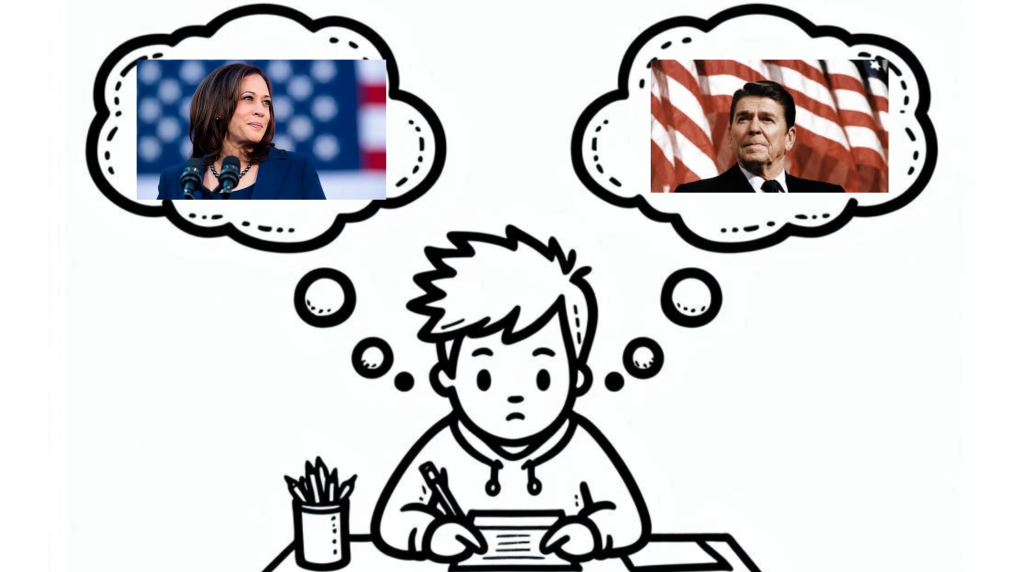

David French’s support of Harris raises questions he’s never really answered
Have you ever had that nightmare where you realize too late that you forgot to show up to the final exam? I’ve had it, and it is no fun. Still, I hope that New York Times columnist David French has it soon. Why? Because a make-up exam is still possible.
French should not have forgotten the original test—after all, he wrote it himself. In February 2020 French announced in The Dispatch his approach to voting in a piece ambitiously titled “How, Then, Should Christians Vote?”: “In each race, I impose a two-part test on candidates. First, they must possess a personal character that is worthy of the office they seek. Second, they must broadly share my political values. If a candidate fails either prong of that test, he or she doesn’t receive my vote.”
French applied this formula to the facts at hand and concluded:
The results of my test are clear. Assuming Donald Trump is the Republican nominee, I can’t vote for him. Even if I do like some of the things he’s done, he lacks the character to be president. But I cannot join some of my Never Trump friends in backing the Democratic nominee. Many of them may well pass the character test, but I cannot vote for a person who would put in place policies I believe are harmful and potentially destructive—especially to unborn life.
I find the French test compelling, and it largely matches my own approach to voting, especially since 2016. You can recognize that no candidate will be perfect but still set some minimum standards on character and policy. If neither of the major party candidates clears these bars, take your vote elsewhere. Stick to your core values and do not let the desire to be on a team with a chance of winning drag your values to match your vote.
Alas, any awareness of this original French test was absent from his recent New York Times column announcing his intention to vote for Kamala Harris. This recent column—with another ambitious title (“To Save Conservatism From Itself, I Am Voting for Harris”) and augmented online with an odd image of female hands praying—does not explicitly employ the framework he announced (and repeated) in 2020. While he explains at length why Donald Trump fails the character prong of his former test, he does not address the character of Harris—nor does he consider her policies, beyond her support for military aid to Ukraine.
If French could not vote for “a person who would put in place policies I believe are harmful and potentially destructive—especially to unborn life” in 2020, then why does he plan to do so in 2024? He does not directly say, but he seems to fall into a modified version of the Flight 93 thinking that Trumpified many principled conservatives. To save America we must take down the GOP plane.
French writes, “[T]his is no ordinary race and . . . the old political categories no longer apply.” He concludes, “The only real hope for restoring a conservatism that values integrity, demonstrates real compassion and defends our foundational constitutional principles isn’t to try to make the best of Trump.” In a leap of logic that ignores third party options, French apparently surmises that to restore national integrity we must sacrifice ours by backing Harris. In a nod to French’s love of Lord of the Rings, one anonymous writer argued that this line of thinking is akin to trying to save the Shire by backing Sauron.
To French’s credit, concern for unborn life has not completely left his mind. He opens with a declaration of his pro-life bona fides and he rightly examines the ways that Trump complicates the pro-life movement in a post-Dobbs world. But he fails to mention Harris’s almost giddy abortion cheerleading, nor does he consider the devastating effect that removing the Hyde Amendment budget rider would have on unborn life—since this rider currently bans most public funding of abortion.
French seems to have been walking up to the point of publicly supporting the Democrats’ nominee for a while now. In March he made a case for Nikki Haley voters to consider Biden while acknowledging abortion as the biggest stumbling block. It was not hard to read that as part of French’s own internal debate. I wish he had stuck to his 2020 neutral framework, but sometime after January 6, 2021, that methodology morphed into the results-oriented simplicity of Trump has to lose.
As Jonah Goldberg, French’s former colleague at The Dispatch, recently pointed out, this does not have to be the case. David resides in very red Tennessee, and therefore has what one might call the luxury of his single vote not impacting the result. Goldberg writes, “To the extent we think of voting as an extension of our values or aspirations or any of that high-minded stuff, if you live in a state where your vote has virtually no chance of making a difference, I think it’s better to send a different kind of signal than the one David is sending. I think sending a message about the kind of candidate you would enthusiastically vote for is preferable to sending a mixed and muddy signal about who you’re voting against.”
I agree with Goldberg, especially when there are options like the American Solidarity Party that can signal virtues (about, say, life, racial justice, and the environment) that I and probably French would actually want to signal.
David French has become a punching bag for many in the MAGA world since he refused to bend the knee to Trump in 2016 and briefly entertained a third party run of his own. Oddly, though, after this final volley now underway, I suspect that the attacks on him from the Trumpian right will decline. As the adage goes, everyone eventually becomes the worst stereotype of themselves. Obviously this does not have to be true. But French is making it come true in his case. At his best, David French called conservatives to remember a principled consistency that they were abandoning. Now that French has proven inconsistent in applying his own test for voting, it may seem easier to dismiss him as a hypocrite.
But it is never too late to do the right thing, even if doing so now may be messier. French had a good approach to voting in 2020. Yes, now that he has publicly endorsed a candidate, he would face the tug of tribalism he has long warned against, should he honestly apply his test to Harris. That does not mean he should not do it anyway.
John Murdock is an attorney who writes from Texas.
Regarding the Hyde Amendment, which the author says “bans most public funding of abortion”:
More precisely, it bans federal funding of elective abortions through Medicaid. The specifics regarding what is covered and what not varies from state to state. But, as regarding the law itself, federal funds *are* allowed for abortons in cases of rape, incest, and life of the mother.
States can choose to pay for abortions for Medicaid enrollees in other instances, but must use their own revenues, not federal funds.
State laws are in some flux since the Dobbs decision, but the latest information I have found indicates:
“32 states and the District of Columbia follow the federal standard and provide abortions in cases of life endangerment, rape and incest.
4 of these states also provide state funds for abortions in cases of fetal impairment.
4 of these states also provide state funds for abortions that are necessary to prevent grave, long-lasting damage to the person’s physical health.
1 state provides abortions only in cases of life endangerment, in apparent violation of the federal standard.
17 states have a policy that directs Medicaid to pay for all or most medically necessary abortions.
8 of these states provide such funds voluntarily.
9 of these states do so pursuant to a court order.”
https://www.guttmacher.org/state-policy/explore/state-funding-abortion-under-medicaid
The Hyde Amendment often figures prominently in arguments over which candidates and parties can be conscientiously supported by pro-life voters. And amny pro-life voters make it an absolute value, one that nullifies all other considerations in any electoral decision. But many of them are also unclear or even ignorant about exactly how the law is in fact framed, and how it operates at the state level.
Obviously, if voters want to make the Hyde Amendment the centerpiece of (something close to) single-issue voting, that’s as legitimate a choice as any. But it’s useful to know just what the Hyde Amendment does and doesn’t do, and therefore what it is one is weighting so significantly.
Importantly, they should be aware that the Hyde Amendment actually *requires* states to pay for abortions that fall under the enumerated exceptions; courts have blocked enforcement of state statutes that prohibit coverage for these exceptions.
https://www.kff.org/womens-health-policy/issue-brief/the-hyde-amendment-and-coverage-for-abortion-services-under-medicaid-in-the-post-roe-era/#:~:text=Starting%20in%201977%2C%20the%20Hyde,result%20from%20rape%20or%20incest.
I understand the point of this, the David French is supporting a candidate who is not prolife, so he is violating his principles and therefore should vote 3rd party instead of Harris.
I am all for people voting 3rd party if they think that is the right option.
However, many (approximately 1/3) of Dem voters have been generally pro-life all along, but think that the best method of addressing abortion is through reducing demand, not making abortion more illegal.
David has written about this many times. He isn’t supportive of full-throated abortion. And Dem rhetoric has shifted from “safe, legal, rare”. But abortion still goes down when there are supportive social safety net policies.
The other problem with this framing is that it ignores the history of the black church’s political theology. The Black church has largely voted in mass for Democrats for 50 years. In the range of 70-90%. They are historically pro-life, but also resistant to active participation in the pro-life movement because of the way it has been connected to white racial politics. A wide variety of Black church leaders has spoken to this. They are pro-life, but not part of the pro-life movement, because of the ways the pro-life movement is resistant to Black concerns.
As framed here I think this piece suggests that David (and others like David) who are voting for Harris, not just against Trump, are violating Christian principles. And while Christians are more likely to be GOP than Democrats, Democrats still have a very large group of Christians who are voting out of what they think are Christian principles. This could be much more narrowly framed than it is. As it is, it seems to me to suggest that David French, and many who are voting like him “have flunked the test.”